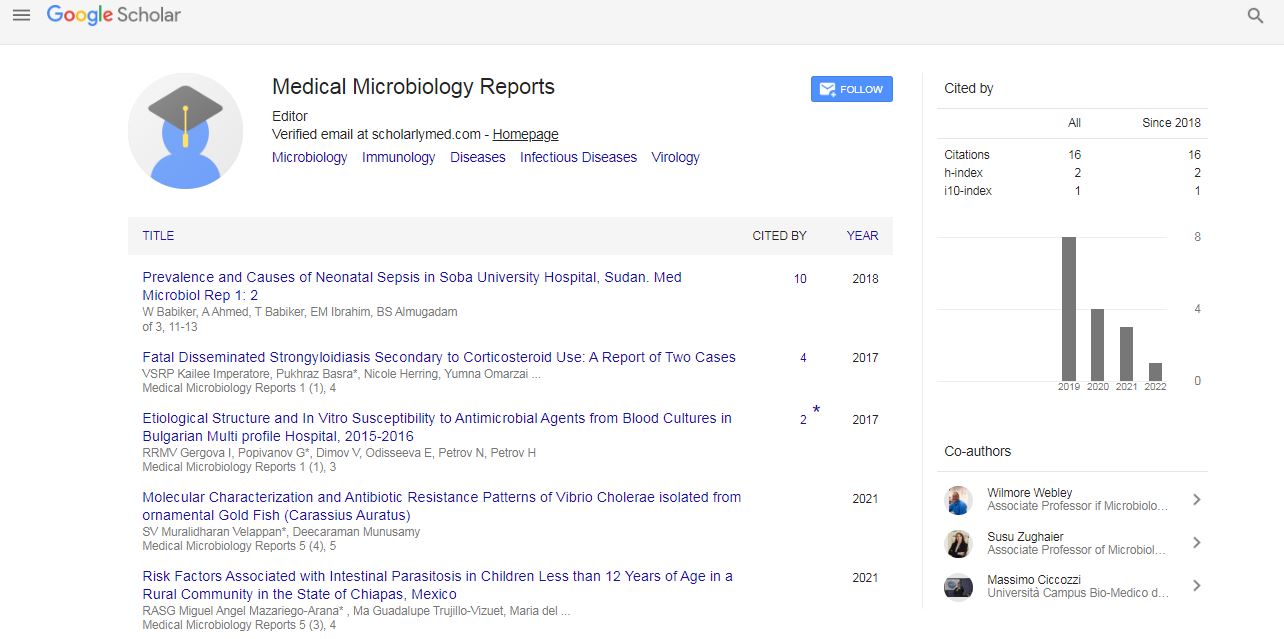Short Communication, Med Microbiol Rep Vol: 5 Issue: 2
Attitude of Mothers towards Self Medication in Amassoma Community of Bayelsa State, Nigeria
Adeyanju Awoniyi Babafemi
Niger Delta University, Nigeria
Abstract
Introduction: The practice of self-medication has long been in existence worldwide, and the situation continues to increase particularly in developing countries (Refuerzo, et al., 2005; Abasiubong, et al, 2012; Lawan, et al., 2013) especially in Sub Saharan Africa (Nsimba, 2007). Self-medication involves acquiring medicines without a prescription, resubmitting old prescriptions to purchase medicines, sharing medicines with relatives or members of one’s social circle (Loyola, et al., 2004; Kumar, et al., 2013). The irrational use of drugs is a cause of public, medical professional (Loyola, et al., 2004; Kumar, et al., 2013) and government concern especially in Nigeria where safe medication is a serious problem (Lawan, et al., 2013).
Keywords: Attitude, mother, alcohol, self-medication.
Keywords
Attitude, mother, alcohol, self-medication.
Introduction
The practice of self-medication has long been in existence worldwide, and the situation continues to increase particularly in developing countries (Refuerzo, et al., 2005; Abasiubong, et al, 2012; Lawan, et al., 2013) especially in Sub Saharan Africa (Nsimba, 2007). Self-medication involves acquiring medicines without a prescription, resubmitting old prescriptions to purchase medicines, sharing medicines with relatives or members of one’s social circle (Loyola, et al., 2004; Kumar, et al., 2013). The irrational use of drugs is a cause of public, medical professional (Loyola, et al., 2004; Kumar, et al., 2013) and government concern especially in Nigeria where safe medication is a serious problem (Lawan, et al., 2013).
Self-medication is a health-seeking behavior among the women within the child bearing age (Lawan, et al., 2013) that is associated with supposedly minor diseases that are usually self-diagnosed and treated with medicines purchased at pharmacies or other medicines outlets (Yusuff and Omarusehe, 2011). This is because pregnant women are known to suffer varieties of minor ailments and there are a lot of medical hazards of self-medication and many of those who practice it are not aware of these hazards. This study examined the attitude of mother towards self-medication in Amassoma, Nigeria.
It was designed to assess the knowledge and attitude of mothers towards self-medication as well as to find out those drugs that are commonly used without prescription and the various reasons that are responsible for these. The following hypotheses were tested: Education status of mothers will determine the attitude of majority of them towards self-medication; giving health education to the majority of mothers will significantly influence their attitude about self-medication; the attitude of majority of mothers towards self-medication will vary with level of income; the majority of mothers in Amassoma would have a significant knowledge of factors that influence self-medication. David mechanic theory of illness behavior was the conceptual frame work used in the study.
Methodology:
The study adopted descriptive design to explore the attitude of mothers towards self-medication in Amassoma Community. The target population comprises of pregnant women and mothers of childbearing age with age 13-40 years irrespectively of their level of education. A total of fourteen compounds were randomly selected out of 22 compounds of which forty persons per compound were selected at random. The sample size was five hundred and sixty (560) pregnant women and mothers within the childbearing age that were randomly selected from the 14 compounds and were given questionnaires. Random samplings were used to select both the compounds and the women by the casting of lots. About 18 (21.1%) were single parents, 54.6% were married, 58 (10.36%) were divorced, 78 (13.93%) were widows. A three sections structured questionnaire was used with test retest coefficient of 0.84 established.
Data collected were analyzed using chi-square, numbers, and percentages. Ethical approval was obtained and permission was obtained from the chiefs of the community, community development committee, and heads of household. The questionnaires were made anonymous to retain respondent`s privacy and confidentiality, consent was obtained verbally from the individual respondents before data collection. The questionnaires were given to the respondents to fill and collected back. The field work lasted for 12 weeks. The numbers and percentage of the respondents in each group and response category were determined. Furthermore, Pearson’s chi-square tested was used to assess the significant differences between variables.
Findings:
Majority of the mothers had a significant knowledge of factors that influence self-medication. Findings revealed that a great numbers of the respondents were fully aware of the malformation that occur due to self-medication during pregnancy, the commonest reasons given for not consulting a qualified personnel for prescription was that of illness not serious enough to require consultation, peer influence and ignorance about the problem resulting from self-medication.
Table 1 revealed that 173 (15.84%) of the respondents take Antimalarial such as chloroquine, fancidar and Quinine. One fifty seven (14.37%) of them claimed they normally take normal routine drugs such as vitamin B complex and folic acid. Another 140 (12.82%) respondents take Antibiotics like Ampiclox, flaggy and ciprofloxacin while 130 (11.91%) take Analgesics, only few uses snuffs and other herbs like tobacco as well as herbs soaked in alcohol when pregnant. It was also revealed that, 369 (65.89%) of the respondents admitted taking drugs without prescription.
| S/N | Responses | Frequency | Percentage |
|---|---|---|---|
| 1 | Routine drugs | 157 | 14.37 |
| 2 | Analgesics | 130 | 11.91 |
| 3 | Herbs/Snuff | 105 | 9.62 |
| 4 | Anti-malaria drugs | 173 | 15.84 |
| Cough mixture | 102 | 9.34 | |
| 6 | Blood tonic | 124 | 11.36 |
| 7 | Drugs to induce sleep | 83 | 7.60 |
| 8 | Antibiotics | 140 | 12.82 |
| 9 | Others | 71 | 6.50 |
| 10 | Do not indulge in self-medication | 7 | 0.64 |
| Total | 1092 | 100.0 |
Respondent selected more than one drug.
Table 1: Frequency table showing the different drugs used without prescription by the respondents when pregnant
From table 2 respondents stated some reasons for not going for prescription, 133 (17.69%) claimed that the hospital bill was too high, 128 (17.02%) gave the reason of long delays in hospital, 111 (14.76%) gave the reason of having been treated before by the Doctor for the same illness before. While 98 (13.03%) claimed the illness not being serious enough to require special attention of qualified personnel. Similarly, levels of income, convectional education and health education were associated with the attitude of the mothers. Respondents with higher education were fully aware of the effects of drugs on the fetus and the mothers; it was deduced that majority of the mothers were aware and informed through their conversation with health workers and were thought to be careful about drug use, and the risks of self-medication and to comply as directed. Majority of the respondents agreed to have heard of the malformations (deformations) resulting from self-medication. They are aware that traditional drugs use can result to harmful effects and can cause damage at specific stages of pregnancy such as foetal malformation, congenital abnormalities and miscarriages. Finally, the implications of this study are the needs for health education and awareness programs on the hazards, the risks and harmful effects as well as malformation that are associated with self-medication.
| S/N | Reasons | Frequency | Percentage |
|---|---|---|---|
| 1 | Long delays in Hospital | 128 | 17.02 |
| 2 | Distance between hospital and home is too much | 103 | 13.70 |
| 3 | The illness was not serious enough | 98 | 13.03 |
| 4 | Doctor has seen me for the problem before | 111 | 14.76 |
| 5 | The hospital bills is too high | 133 | 17.69 |
| 6 | Behaviour of hospital personnel towards me. | 92 | 12.23 |
| 7 | Widespread use/Product availability | 87 | 11.58 |
| Total | 752 | 100.0 |
Respondents selected more than one reason.
Table 2: Distribution of respondents based on reasons for not going for prescription
Conclusion:
It was suggested that government and non-governmental organization should see to the unnecessary media advertisement of drugs and ensures that only qualified pharmacist are allowed the sale and dispense of drugs. The health workers in collaboration with the community leaders should know the risk and the problems of harmful drugs use and ensure they inform the mothers. Mothers are encouraged to always seek counsel and take only drugs prescribed by physicians during pregnancy. Effort should be made by hospital authorities to minimize delay in obtaining services.
 Spanish
Spanish  Chinese
Chinese  Russian
Russian  German
German  French
French  Japanese
Japanese  Portuguese
Portuguese  Hindi
Hindi 
